
Water Practice and Technology
Scope & Guideline
Connecting Research and Practice in Water Technology
Introduction
Aims and Scopes
- Water Quality Assessment:
Research on the evaluation of water quality parameters, including chemical, biological, and physical characteristics, to ensure safe drinking water and environmental protection. - Treatment Technologies:
Development and optimization of various water and wastewater treatment methods, including advanced oxidation processes, adsorption techniques, and biological treatments. - Hydrological Modeling:
Application of hydrological models to analyze water flow, sediment transport, and the impact of land use changes on water resources. - Emerging Contaminants:
Investigation of the presence, effects, and removal methods of emerging contaminants in water bodies, including pharmaceuticals and personal care products. - Sustainable Water Management:
Exploration of sustainable practices for water resource management, including rainwater harvesting, wastewater reuse, and integrated water resource management. - Climate Change Impacts:
Assessment of the impacts of climate variability on water resources, including changes in precipitation patterns, droughts, and flood risk. - Machine Learning Applications:
Integration of machine learning techniques for predicting water quality, managing water distribution systems, and optimizing treatment processes.
Trending and Emerging
- Smart Water Management Technologies:
There is a growing trend in the development and application of IoT and AI-based technologies for real-time water quality monitoring and management. - Bioremediation and Green Solutions:
Increasing emphasis on the use of biological processes and eco-friendly materials for water treatment, reflecting a shift towards sustainable practices. - Climate Resilience and Adaptation Strategies:
Research focusing on the adaptation of water systems to climate change impacts, including flood and drought management, is gaining momentum. - Advanced Data Analytics:
The use of big data and machine learning for predictive modeling and optimization in water resource management is a rapidly emerging area of interest. - Community-Based Water Management:
There is an increasing focus on participatory approaches to water management that involve local communities in decision-making processes.
Declining or Waning
- Conventional Water Treatment Methods:
There has been a noticeable decrease in publications related to traditional water treatment methods, as researchers increasingly explore innovative and advanced techniques. - Basic Water Supply Infrastructure Studies:
Research focusing solely on basic infrastructure assessments is waning, as there is a shift toward integrated approaches that combine technology with social and environmental considerations. - Static Water Quality Monitoring:
Studies that emphasize static or one-time assessments of water quality are decreasing, with a growing preference for dynamic and real-time monitoring systems. - Single Contaminant Studies:
Research focusing on the removal of single contaminants is declining as there is an increasing recognition of the need to address multiple pollutants simultaneously.
Similar Journals
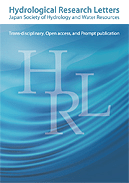
Hydrological Research Letters
Catalyzing Change: Essential Insights for Water ManagementHydrological Research Letters (ISSN: 1882-3416) is a distinguished peer-reviewed journal published by JSHWR, JAGH, JAHS, JSPH in Japan. Established with open access since 2007, this journal serves as a critical platform for the dissemination of innovative research in the field of hydrology, water science, and technology. With an increasing impact factor, currently positioned in the Q3 quartile for both Earth and Planetary Sciences and Water Science and Technology, it attracts a diverse readership keen to stay abreast of groundbreaking findings that shape water management and environmental policy. Researchers, professionals, and students alike will find this publication an invaluable resource for enhancing their understanding of hydrological processes and their implications. The journal is committed to fostering open academic dialogue and encouraging high-quality contributions during its converging years from 2015 to 2024. For more information, authors and readers can access the journal at its address, C/O INT ACAD PRINTING CO, LTD, Shinjuku-ku, Tokyo, Japan.

Tecnologia y Ciencias del Agua
Elevating the discourse on water science and technology.Tecnologia y Ciencias del Agua is a dynamic and innovative open access journal published by the Instituto Mexicano de Tecnología del Agua, dedicated to advancing knowledge in the fields of civil and structural engineering as well as water science and technology. Since its inception in 1930, the journal has provided a platform for interdisciplinary research and discussion, catering to an audience of researchers, professionals, and students interested in the management of water resources and sustainable engineering practices. With an ISSN of 0187-8336, and an E-ISSN of 2007-2422, this journal has converged its focus from 2010 through 2024, although it currently holds Q4 quartiles in its category as per the 2023 rankings, indicating its evolving role within the global landscape of academic publishing. Despite its emerging status, the journal's commitment to disseminating high-quality, peer-reviewed research on critical topics related to water management and engineering continues to enhance its relevance and appeal. The journal is based in Morelos, Mexico, contributing to the region's rich academic tradition while also engaging with a broader international audience through its extensive open access policy.
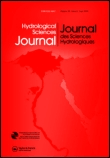
Hydrological Sciences Journal
Elevating understanding of our vital water systems.Hydrological Sciences Journal, published by Taylor & Francis Ltd, is a leading peer-reviewed publication dedicated to advancing the field of hydrology, spanning topics from water management to climate impacts on hydrological systems. With an impressive impact factor and a noted Q1 category ranking in Water Science and Technology, the journal occupies a pivotal role in the academic landscape, facilitating high-quality research dissemination since its inception in 1982. The journal is indexed in Scopus, holding a commendable rank of #48 out of 261 in the Environmental Science category, placing it in the 81st percentile among its peers. Although it does not offer Open Access options, the journal ensures extensive reach and readership through institutional subscriptions. As it converges toward its milestone of 2024, the Hydrological Sciences Journal remains an indispensable resource for researchers, professionals, and students eager to explore the latest advancements and methodologies in hydrological research.
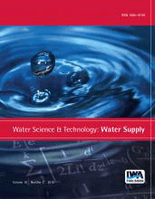
Water Supply
Exploring innovations in water science.Water Supply is an esteemed journal published by IWA PUBLISHING that plays a pivotal role in the field of water science and technology. With an ISSN of 1606-9749 and an E-ISSN of 1607-0798, this journal has been a key resource for researchers and professionals since its inception in 2001. Now covering a wide range of topics until 2024, it is recognized for its impactful contributions, holding a Q2 ranking in the Environmental Science: Water Science and Technology category, and currently stands at rank #125 out of 261 in Scopus, reflecting its relevance and influence in the academic community. The journal aims to disseminate significant research findings and innovations in water supply management, ensuring that professionals and students are equipped with the latest knowledge and practices in the sector. Despite not being an open-access journal, Water Supply continues to attract high-quality submissions that enhance our understanding and preservation of vital water resources. For those invested in sustainable water practices, this journal is an invaluable tool for continued learning and advancement.
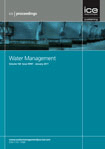
PROCEEDINGS OF THE INSTITUTION OF CIVIL ENGINEERS-WATER MANAGEMENT
Exploring Innovations in Civil Engineering Water PracticesPROCEEDINGS OF THE INSTITUTION OF CIVIL ENGINEERS-WATER MANAGEMENT is a prestigious journal published by Emerald Group Publishing Ltd, dedicated to advancing the field of water management within civil engineering. With an ISSN of 1741-7589 and an E-ISSN of 1751-7729, this journal delivers peer-reviewed research that spans the critical intersections of water science and technology, contributing valuable insights into sustainable water management practices. As evidenced by its ranking in the 2023 Scopus categories, where it holds the Q3 quartile in Water Science and Technology, and a respectable position among its peers, the journal remains a vital resource for researchers, professionals, and students in the field. Though it is not an open-access journal, it offers accessible subscription options that facilitate worldwide dissemination of knowledge, enhancing its role as a fundamental reference point for cutting-edge developments in water management. For those looking to publish or stay updated on the latest research trends, this journal serves as an essential platform for promoting innovation and sustainable practices in civil engineering and water resources management.

Journal of Applied Water Engineering and Research
Innovating Solutions for Sustainable Water ManagementJournal of Applied Water Engineering and Research is a dynamic platform dedicated to the advancement of knowledge in the field of water science and technology. Published by Taylor & Francis Ltd, this journal aims to bridge the gap between theoretical research and practical applications in water engineering, providing a crucial resource for researchers, practitioners, and policymakers. With an ISSN of 2324-9676 and an impressive ranking in the Q3 category for Water Science and Technology, it occupies a distinctive position within the scholarly community. The journal covers a wide spectrum of topics, including innovative water management strategies, sustainable practices, and the integration of technology in water resource management, thus contributing significantly to the discourse surrounding environmental sustainability. With publication years converging from 2013 to 2024, the Journal of Applied Water Engineering and Research continues to foster impactful research, enhancing our understanding and management of vital water resources.
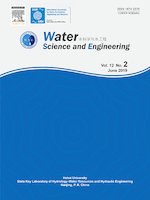
Water Science and Engineering
Unveiling the Science Behind Water Engineering ExcellenceWater Science and Engineering, published by ELSEVIER, is a premier open access journal that has been disseminating vital research in the realms of civil and structural engineering as well as ocean engineering since 2008. With its ISSN 1674-2370 and E-ISSN 2405-8106, this journal plays a crucial role in advancing knowledge and innovation within the sector, evidenced by its impressive rankings in Scopus—holding the 15th position out of 105 in Ocean Engineering and 76th out of 379 in Civil and Structural Engineering, placing it in the 86th and 80th percentiles, respectively. Attaining a Q1 classification in both categories for 2023 highlights its importance and influence in the academic and professional communities. The journal addresses a broad spectrum of topics integral to water sciences, offering significant insights for researchers, professionals, and students alike. With a convergence period spanning from 2010 to 2024, it continues to explore contemporary issues and advancements, providing a pivotal platform for the dissemination of research. The journal is accessible to a global audience, reaffirming its commitment to fostering open access and enhancing accessibility to vital scientific literature.

Water Resources
Advancing sustainable solutions for our most vital resource.Water Resources, a prominent journal published by MAIK NAUKA/INTERPERIODICA/SPRINGER, focuses on the critical and evolving field of water science and technology. Established in 1976 and with a long-standing commitment to advancing knowledge, this journal explores interdisciplinary research that addresses the challenges surrounding water resource management, quality, and sustainability. With an impact factor positioned within the Q3 category of its field, it holds a notable Scopus rank (#181/261) in Environmental Science, emphasizing its role in driving scholarly discourse. While currently not open access, Water Resources provides vital insights for researchers, professionals, and students, making it an essential resource for those seeking to innovate and implement effective water management solutions. To stay ahead in a domain that is increasingly paramount to global sustainability efforts, consider engaging with the latest research published in this vital journal.
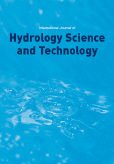
International Journal of Hydrology Science and Technology
Fostering Interdisciplinary Dialogue for Water Resource ManagementThe International Journal of Hydrology Science and Technology, published by InderScience Enterprises Ltd, is a distinguished platform dedicated to advancing knowledge in the field of hydrology, environmental engineering, and water science. With an ISSN of 2042-7808 and an E-ISSN of 2042-7816, this journal, established in 2011 and continuing through 2024, serves as an essential resource for researchers, professionals, and students alike. Despite being categorized in the Q3 quartile across multiple disciplines including Earth and Planetary Sciences, Environmental Engineering, Waste Management and Disposal, and Water Science and Technology, the journal maintains a reputation for contributing significant findings that impact both theory and practical applications in addressing hydrological challenges. Currently unavailable through Open Access options, the journal remains committed to disseminating valuable research that informs sustainable practices in water resource management. The editorial team encourages submissions that explore innovative strategies and methodologies while fostering interdisciplinary discussions, making this journal a pivotal player in shaping the future of hydrological science.
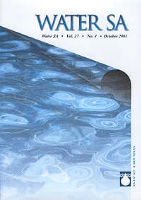
WATER SA
Fostering interdisciplinary dialogue for water solutions.WATER SA, published by the WATER RESEARCH COMMISSION, serves as a pivotal platform for interdisciplinary research in the areas of water science and technology. With an ISSN of 0378-4738 and an E-ISSN of 1816-7950, this open-access journal has been committed to disseminating knowledge since 2005, ensuring that research is freely accessible to a global audience. As of 2023, it holds a Q3 ranking in several key categories including Applied Microbiology and Biotechnology, Management, Monitoring, Policy and Law, Waste Management and Disposal, and Water Science and Technology. These rankings reflect its significant contribution to these disciplines, particularly in South Africa where it is based. With a history dating back to 1976 and converging research efforts extending through 2024, WATER SA aims to illuminate pressing water-related challenges and foster innovative solutions through rigorous scientific inquiry. Researchers, professionals, and students interested in the sustainability and management of water resources will find its comprehensive portfolio essential for advancing their work and understanding in an increasingly critical field.